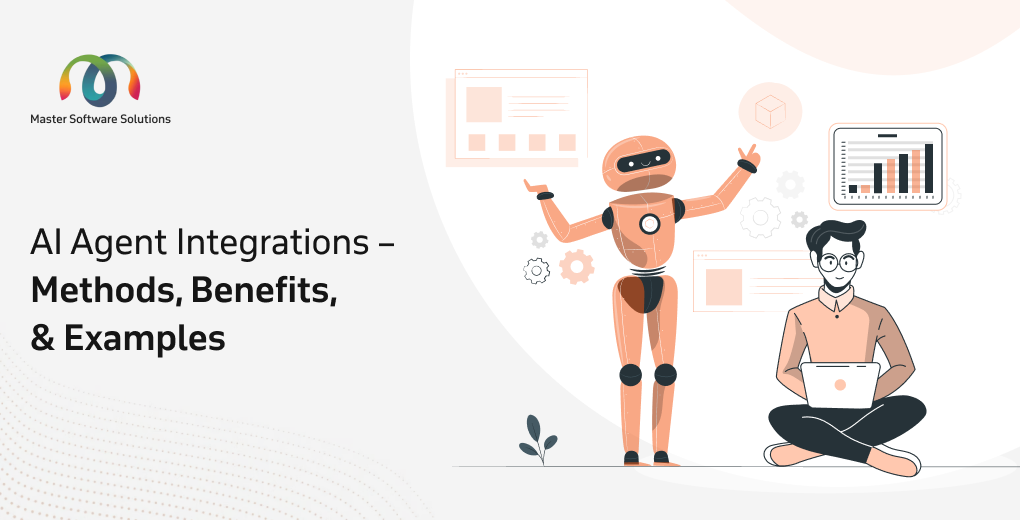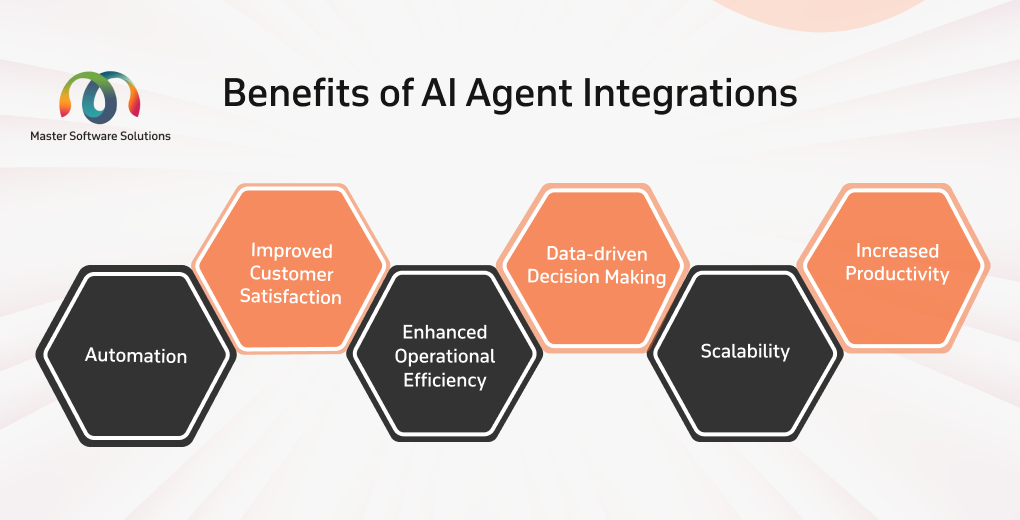Artificial intelligence is a rapidly growing technology, and AI agents stand at the forefront of this revolution. AI agents are autonomous systems that can perceive their environment, make decisions, and act accordingly to achieve specific goals.
This blog explores AI agent integrations that can help you take your business to the next level, improving operational efficiencies, productivity, and customer experience. We’ll also discuss how our AI agent integration services can help your business.
Introducing AI agent integration
AI agent integration refers to connecting AI agents with other tools and systems to enhance their functionalities and effectiveness. Integrating AI agents with your business operations enables them to access and process data, make more informed decisions, and automate tasks across various platforms.
Methods of AI agent integrations
Integrating an AI agent with various systems and data is crucial to enhance productivity, improve accuracy, and expand availability. They can streamline data collection, automate processes, and foster better decision-making, maximizing efficiency and cost savings. AI agent integration methods are:
API integration for external services
Integrating AI agents using APIs (Application Programming Interfaces) enables agents to communicate and share data with external software applications, platforms, and services. API integration allows agents to access real-time data, trigger actions, and participate in broader digital workflows.
RAG (Retrieval-Augmented Generation) Platform
RAG enhances the knowledge of AI agents’ large language models (LLMs). This enables them to retrieve information from external knowledge bases and use it to respond or take actions. A RAG platform provides the infrastructure and tools to facilitate the process. The process:
- Retrieval – The information is gathered from an external knowledge base (a document, a website, or vector DB).
- Augmentation – The retrieved data is included in the prompt or context provided to the LLM.
- Generation – LLM uses augmented information with its pre-existing knowledge and provides more accurate, relevant, and contextually appropriate responses or takes actions.
No-code templates
The no-code platform offers pre-built templates and visual interfaces that allow you to create and integrate AI agents without extensive programming skills. These platforms provide a foundation for use cases, simplifying the integration process with various processes.
IoT devices
Integrating AI agents with IoT devices enables them to interact with the physical world, collect real-time data using sensors, and control actuators. This integration empowers your AI agent to respond to environmental changes and user needs.
Benefits of AI agent integrations
AI agent integration into existing systems and workflows offers significant advantages to improve various operational aspects and customer experiences. Here are the key advantages of AI integrations:
Automation
AI agents can handle repetitive, routine, and rule-based tasks that require significant human effort. Integration automates these processes within your existing systems. AI agents or multi-agent systems can even help you automate complex tasks.
Improved customer satisfaction
AI agent integration empowers you with faster, more personalized, and more efficient support, significantly enhancing customer experience. For instance, integrating an AI agent with your CRM provides real-time access to comprehensive customer information for more informed and personalized interaction.
Enhanced operational efficiency
Integrating AI agents to automate tasks, optimize processes, and provide insightful data can enhance operational efficiency. For example, integrating AI agents to analyze the production line identifies inefficiencies and suggests improvements, increasing outputs and reducing waste.
Data-driven decision making
AI agents can process and analyze vast amounts of data to provide valuable insights and patterns for better decision-making. Integrated AI agents analyze sales data, marketing campaign performance, and customer feedback, fostering data-driven recommendations for business strategy.
Scalability
AI agent integrations can handle increased workloads unlike a normal human, making it easier to scale operations and services. For example, an integrated AI agent for customer support can handle increased inquiries without impacting the response time.
Increased Productivity
Automating repetitive and time-consuming tasks frees your employees to focus on more strategic, creative, and complex work that requires solely human skills. For instance, AI agents can handle data entry tasks and reports, allowing your data analyst to interpret the data and formulate insights.
Examples of AI agent integration
AI agent integration with different systems to improve operational efficiency across various sectors. This section discusses AI integration with business operations and its functionalities. Some of the examples of AI agent integration:
Inventory management
AI agents are integrated with enterprise resource planning (ERP) systems, like Odoo or Microsoft Dynamics Central, warehouse management systems, and IoT sensors for monitoring inventory management software. They can reduce stock-carrying costs, minimize stockouts and overstocking, and improve fulfillment rates. AI agent integration for inventory management can help you:
- Analyze historical sales data, seasonal trends, and external factors to predict future demand accurately.
- Automatically adjust reorder points and generate purchase orders when the inventory falls below the threshold.
- Detect and alert managers about potential stockouts, overstocking, or spoilage based on real-time data.
Customer support
AI chatbot integration with CRM systems, knowledge bases, and communication channels (websites, social media, and messaging apps, like WhatsApp or Telegram). The AI agents provide real-time information and suggest solutions, assisting human agents. AI agent integration for customer support can help you:
Instant response to frequently asked questions to resolve basic queries, guiding customers through self-service options.
- Access customer history and context from the CRM to offer a personalized customer experience.
- Analyze customer sentiments and identify areas for improvement.
- Provide real-time knowledge base articles and suggest responses during live interactions.
Sales and marketing
AI agents are integrated with CRM, marketing automation, social media platforms, and sales intelligence tools. Integrating AI agents with sales and marketing operations can increase lead generation, improve conversion rates, enhance customer engagement, optimize marketing spend, and personalize customer experience. You can create personalized region-specific Ad campaigns using dubbing AI, improving your reach and marketing efforts. AI agent integration for sales and marketing can:
- Analyze customer data to identify leads, segment the audience, and personalize marketing messages.
- They can automate lead-nurturing campaigns and trigger personalized follow-ups based on customer behaviour.
- Provides insights into prospect behaviour and predicting deal closure probabilities.
- Analyze campaign performance and automatically adjust bids and targeting to optimize marketing expenditure.
E-commerce
Integrate an AI agent with product catalogs, recommendation engines, payment gateways, and customer service platforms. This integration can help you increase sales, improve customer experience, optimize pricing strategies, streamline operations, and reduce fraud. AI integration with e-commerce can:
- Provide search features and personalized product recommendations.
- Adjust prices based on demand, competitor pricing, and inventory levels dynamically.
- Automate order processing, shipping, and return management.
- Detect and prevent fraudulent activities.
Retail
Integrate AI agents with point-of-sale (POS) systems, inventory management, customer loyalty programs, and digital signage. AI agents in retail can enhance customer experience, increase sales, optimize inventory, improve efficiency, and make data-driven merchandising decisions. The AI agent integration with retail can:
- Personalize product recommendations and promotions at the point of sale.
- Analyze customer behaviour to optimize product placement on the shelves.
- Automate inventory replenishment to manage stock levels across multiple platforms.
- Analyze customer foot traffic and optimize staffing levels.
Manufacturing
Integrate AI agents with industrial control systems, quality control systems, predictive maintenance platforms, and supply chain management. Such integrations can help you increase production output, reduce downtime, improve product quality, optimize resource allocation, and enhance supply chain resilience. AI agent integration with manufacturing operations can:
- Monitor the production line to identify bottlenecks.
- Implement predictive maintenance schedules based on sensor data, preventing equipment failures.
- Automate quality control using computer vision and machine learning
- Manage material flow and components across resource allocation.
Transportation and logistics
Integrate GPS systems, traffic management systems, fleet management systems, and weather data providers. This can help reduce transportation costs, speed up deliveries, improve efficiency, enhance safety, and optimize resource allocation. AI agent integration with transportation and logistics operations can:
- Optimize delivery routes, minimizing travel time and fuel consumption.
- Predict traffic and suggest alternative routes in real-time.
- Automate vehicle and driver dispatching and scheduling.
- Monitor vehicle performance and predict maintenance needs.
- Optimize warehouse operations for efficient loading and unloading.
How does Master Software Solutions help with AI agent integrations?
Master Software Solutions offers one-stop AI agent integration services for seamless and automated workflow. We provide 100+ turnkey AI agent solutions that can be integrated with your business operations for enhanced efficiency and productivity. Our AI agent development can help you transform how businesses leverage AI agents, streamlining the usage across multiple platforms. Book a call to discuss your AI agent integration needs and see how we can help.

